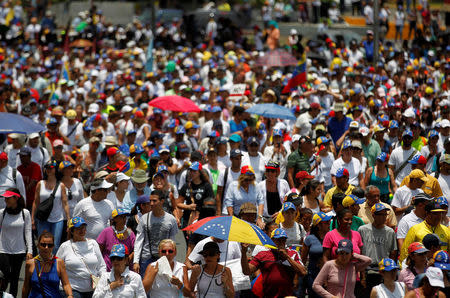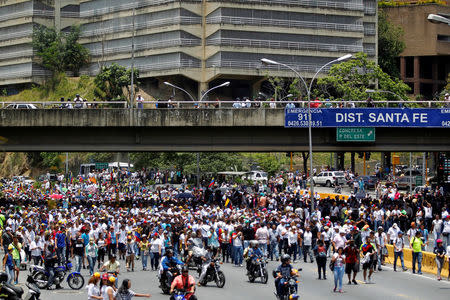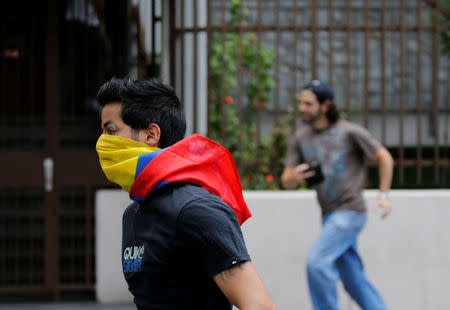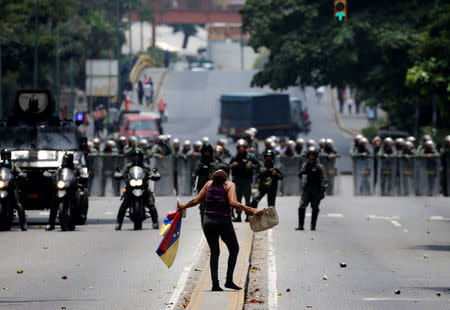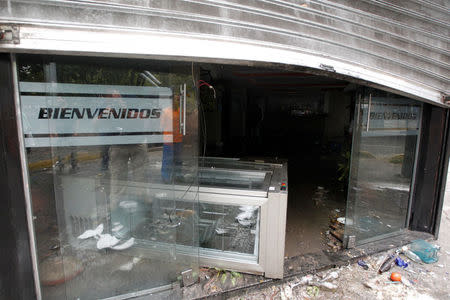Venezuelan opposition plans more protests against Maduro
By Brian Ellsworth CARACAS (Reuters) - Venezuela's opposition called for renewed nationwide protests on Thursday to pressure the government of President Nicolas Maduro to hold elections and improve a collapsing economy, a day after three people were killed in similar demonstrations. Hundreds of thousands of people flooded the streets of Caracas and provincial cities on Wednesday, the latest and largest in several weeks of protests against what Maduro's opponents condemn as a lurch toward dictatorship. Government officials dismiss the protests, characterized by street barricades and clashes with security forces, as violent and lawless efforts to overthrow Maduro's leftist government with the backing of ideological adversaries in Washington. The opposition counters that Maduro, deeply unpopular as Venezuelans grapple with triple-digit inflation and shortages of food and basic consumer goods, is seeking to stay in power indefinitely by barring opposition leaders from office and quashing independent state institutions. "We're going to stay in the streets, this has to end," said bodyguard Yorman Barrios, 25, near clashes between demonstrators and security forces on Wednesday. The opposition called on its supporters to gather in about two dozens points around Caracas and march to the office of the state ombudsman, a human rights activist, just as they tried to do on Wednesday. The current wave of marches, the most sustained protests against Maduro since 2014, has sparked regular melees in which youths and National Guard troops exchange volleys of rocks and tear gas. There were also late-night barricades and some looting in Caracas' middle class neighbourhood of El Paraiso on Wednesday night. Two students and a National Guard officer were killed in Wednesday's demonstrations, bringing the death toll in demonstrations this month to eight. Rights group Penal Forum said more than 500 people had been arrested. Maduro, 54, called on his backers to stage counter-demonstrations in Caracas on Wednesday. Supporters of the president, who was elected in 2013 and assumed the socialist mantle of late leader Hugo Chavez, say the opposition's street protests are violent disruptions of public order that exceed the rights of free assembly and would not be tolerated in any other country. WAVE OF PROTESTS The renewed wave of protests was sparked by a Supreme Court move in March to assume the powers of the opposition-led Congress, a move that it largely reversed a few days later. They were further fuelled when the government barred the opposition's best-known leader, two-time presidential candidate Henrique Capriles, from holding public office. The push to keep up constant demonstrations increasingly mirrors protests in 2014 in which Maduro's critics barricaded streets and battled police for close to three months. That effort ultimately faded amid protester fatigue and a heavy state crackdown. But the sharp deterioration of the economy, which has put many foods and medicines out of the reach of the average citizen, and a more organised and united opposition coalition have injected fresh energy into the current protests. Maduro critics increasingly doubt that the ruling Socialist Party, which was soundly defeated in 2015 legislative elections, will allow for free and fair elections. The ballot for state governors has been delayed since last year and elections authorities have not announced when it will be held. (Additional reporting by Christian Veron; Editing by Alexandra Ulmer and Frances Kerry)

 Yahoo News
Yahoo News 